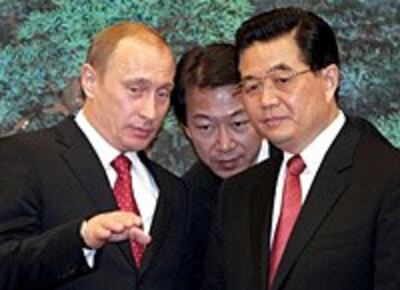
Russian President Vladimir Putin’s March 21 visit to China has brought only limited progress on bilateral energy deals, analysts say. Pipeline projects that have been promised for years still face long delays.
The China National Petroleum Corp. (CNPC) failed, for example, to obtain a firm contract for a line to supply as many as 600,000 barrels of oil per day to China’s Daqing oil center.
Putin first promised that Russia would build the pipeline during former Chinese president Jiang Zemin’s visit to Moscow in 2001.
In an interview with Radio Free Asia, Marshall Goldman—associate director of Harvard University’s Davis Center for Russian and Eurasian Studies—said Moscow believes it can afford to make deals difficult because it has energy supplies that other countries want.
The Russians still feel that they’re very much in the driver’s seat. They’ve got the energy. People have to come to them on their terms
“The Russians still feel that they’re very much in the driver’s seat,” Goldman said. “They’ve got the energy. People have to come to them on their terms.”
In the case of the long-awaited pipeline to Daqing, CNPC general director Chen Geng said before Putin’s visit that an agreement with the Russian pipeline company Transneft would commit them to start a feasibility study for the project.
But the Interfax news agency reported following the visit that a resulting protocol only confirmed an earlier agreement for the study.
China meanwhile remains concerned that Russia may extend another pipeline past Daqing and sell its oil directly to Japan.
Despite promises and agreements, Goldman said, Russia remains wary about building pipelines to China as a sole customer. Once the pipelines are built, he said, Russia fears China may use its position as a monopoly buyer to lower prices for supplies.
Mikkal Herberg, director of the Asia Security Program at the Seattle-based National Bureau of Asian Research, said trust between the two countries is “an issue.” Another concern, he said, is the labor needed for projects planned in Russia’s underpopulated Far East.
“There aren’t enough Russians out there to do that. But the Russians certainly don’t seem to be interested in having thousands of Chinese move into the region to build those pipelines.”
Herberg said that China has been frustrated not just by issues of “trust” but by its dealings with Russian bureaucracy.
In one example of Russian policy disarray, the head of Russian Railways, Vladimir Yakunin, recently complained that the Russian government hasn't coordinated the competing investment plans for supplying oil to China by pipeline and by rail.
Herberg said that China finds problems like this impossible to deal with.
“No amount of negotiation will lead to any building of trust until that’s sorted out on the Russian side,” Herberg added.
Original reporting by Michael Lelyveld. Edited for the Web by Richard Finney.
